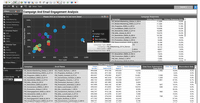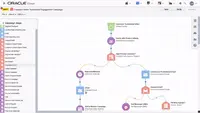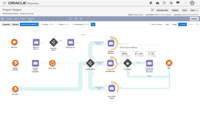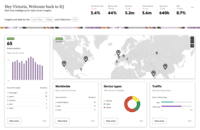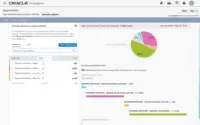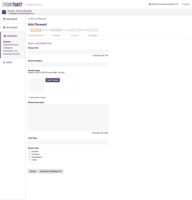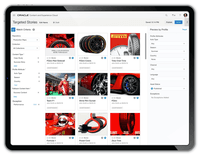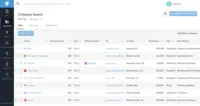Overview
What is Oracle Marketing?
Oracle CX Marketing (formerly Oracle Marketing Cloud) is a solution designed to enable marketers to plan and execute automated marketing campaigns via email, display search, video advertising, and mobile while delivering a personalized customer experience for their prospects.
Awards
Products that are considered exceptional by their customers based on a variety of criteria win TrustRadius awards. Learn more about the types of TrustRadius awards to make the best purchase decision. More about TrustRadius Awards
Popular Features
- Email deliverability reporting (127)9.595%
- Dashboards (122)8.989%
- List management (126)8.989%
- Landing pages (124)8.080%
Reviewer Pros & Cons
Pricing
Entry-level set up fee?
- Setup fee optional
Offerings
- Free Trial
- Free/Freemium Version
- Premium Consulting/Integration Services
Starting price (does not include set up fee)
- $2,000 per month
Features
Product Details
- About
- Integrations
- Competitors
- Tech Details
- Downloadables
- FAQs
What is Oracle Marketing?
Oracle CX Marketing (formerly Oracle Marketing Cloud) is a suite of digital marketing solutions that help B2B & B2C marketers use real-time intelligence & customer signals to deliver personalized experiences. Products include:
- Oracle Eloqua: Marketing automation to create & execute brilliant B2B campaigns
- Oracle Responsys: Cross-channel customer experience orchestration for B2C marketers, enabling them to deliver value to every individual
- Oracle Maxymiser: Customer journey optimization across websites & mobile apps through testing, personalization, recommendations, & insights
- Oracle Infinity: Behavioral intelligence streaming & real-time decision making for applications, at scale
- Oracle CX Audience: Precise targeting & audience analytics to drive engagement and marketing ROI
- Oracle CrowdTwist: Personalized loyalty & reward programs to grow brand value, purchase frequency, and customer relationships
- Oracle CX Content: Personalized, scalable content creation powered by AI for consistent experiences across apps & channels
- Oracle Unity: Single, dynamic view of the customer through unified online, offline, & third-party data
- Oracle DataFox: Verified company data & real-time signals to drive personalized marketing
These tools help marketers unify customer data, deliver relevant experiences at scale & in real time, and easily execute sophisticated cross-channel marketing to accelerate business growth & brand loyalty.
Oracle Marketing Features
Email & Online Marketing Features
- Supported: WYSIWYG email editor
- Supported: Dynamic content
- Supported: Ability to test dynamic content
- Supported: Landing pages
- Supported: A/B testing
- Supported: Mobile optimization
- Supported: Email deliverability reporting
- Supported: List management
- Supported: Triggered drip sequences
Lead Management Features
- Supported: Lead nurturing automation
- Supported: Lead scoring and grading
- Supported: Data quality management
- Supported: Automated sales alerts and tasks
Campaign Management Features
- Supported: Calendaring
- Supported: Event/webinar marketing
Social Media Marketing Features
- Supported: Social sharing and campaigns
- Supported: Social profile integration
Reporting & Analytics Features
- Supported: Dashboards
- Supported: Standard reports
- Supported: Custom reports
Platform & Infrastructure Features
- Supported: API
- Supported: Role-based workflow & approvals
- Supported: Customizability
- Supported: Integration with Salesforce.com
- Supported: Integration with Microsoft Dynamics CRM
- Supported: Integration with SugarCRM
Oracle Marketing Screenshots
Oracle Marketing Videos
Oracle Marketing Integrations
- Salesforce Sales Cloud
- Insightpool Social Selling Platform
- Oracle CRM On Demand
- Microsoft Dynamics 365
- Oracle Engagement Cloud (formerly Oracle Sales Cloud)
- Oracle Marketing App Cloud
- Verticurl
- DemandGen
- MarketOne
Oracle Marketing Competitors
Oracle Marketing Technical Details
| Deployment Types | Software as a Service (SaaS), Cloud, or Web-Based |
|---|---|
| Operating Systems | Unspecified |
| Mobile Application | Mobile Web |
| Supported Countries | North & South America, EMEA, APAC, Japan |
| Supported Languages | English, French Canadian, French European, German, Spanish, Brazilian Portuguese, Chinese (Simplified), Chinese (Traditional), Czech, Danish, Dutch, Finnish, Hungarian, Italian, Japanese, Korean, Norwegian, Polish, Russian, Swedish, Turkish |



